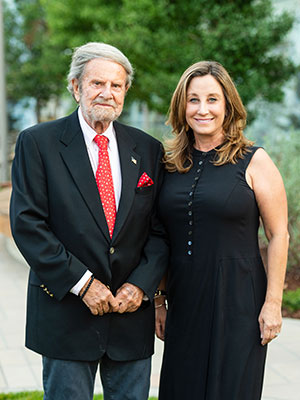Tad and Dianne Taube Commit $6 Million to the Stanford University School of Medicine for Pediatric Cancer Research
Donation will advance research on breakthrough cancer therapies at the School of Medicine and Lucile Packard Children’s Hospital Stanford
For release: April 18, 2019
From the Lucile Packard Foundation for Children’s Health

PALO ALTO, Calif. – Silicon Valley philanthropists Tad and Dianne Taube have committed $6 million to the Stanford University School of Medicine to establish the Taube Initiative in Pediatric Cancer Research, which will further the development of innovative therapies to improve the cure rates for childhood cancer.
“It is essential that we help society’s most vulnerable, our children, to beat cancer,” says Tad Taube, chairman of Taube Philanthropies. “Researchers at Stanford, one of the world’s preeminent research institutions, are leading the way in the search for better treatments for this dreadful disease. We are proud to support them in their effort to save countless children’s lives.”
The gift will accelerate the work of researchers at the School of Medicine and Lucile Packard Children’s Hospital Stanford who are exploring promising areas of discovery such as cancer genomics and immunotherapy. The new Taube Initiative in Pediatric Cancer Research will support two faculty members performing cutting-edge cancer research in key areas and establish a fund for future innovation.
Generous contribution to Stanford Medicine's researchers
“Through their generous contribution, Tad and Dianne Taube are accelerating the development of childhood cancer therapies that are more personalized, more precise, and more effective,” says Lloyd Minor, MD, the Carl and Elizabeth Naumann Dean of the Stanford University School of Medicine. “I am immensely grateful for their support of Stanford Medicine’s researchers and their dedication to improving the lives of children around the world.”
The Taube Distinguished Scholar in Pediatric Immunotherapy will focus on developing and advancing immunotherapy treatments for childhood cancers. This type of therapy is associated with fewer long-term toxicities than chemotherapy and radiation, which kill cancer cells but also destroy healthy cells and weaken the immune system. Immunotherapy equips the patient’s own immune cells to specifically attack cancer cells.
The Taube Distinguished Scholar for Pediatric Oncology will focus on developing customized therapies to treat childhood cancers utilizing knowledge of the genetic differences found in cancer cells.
Secondly, the Taube Innovation Fund in Pediatric Cancer will support innovative research and clinical projects within the Division of Hematology/Oncology in the Department of Pediatrics at the School of Medicine.
Stanford has built world-class clinical, research, and manufacturing facilities and recruited leading researchers. Its researchers are already leaders in translating the lessons of immunotherapy, pioneered for leukemia, into new treatments to combat incurable solid tumors that affect children.
The Taubes’ gift will help sustain this progress and continue to grow a vibrant research community committed to curing children with cancer.
“We are committed to advancing the treatment of childhood cancer, but we could not do this work without the generous support of donors like the Taubes,” says Mary Leonard, MD, MSCE, Arline and Pete Harman Professor and Chair of the Department of Pediatrics. “We are very grateful for philanthropists in our community who support our efforts to help children live longer, healthier lives.”
Additionally, the Taubes have given generously to other areas of the School of Medicine and Packard Children’s. Their recent gifts, now totaling over $40 million, include:
- $20 million to help open the Tad and Dianne Taube Pavilion at Packard Children’s new Main building, which houses state-of-the-art operating rooms, imaging suites and intensive care units
- $9.5 million to establish the Tad and Dianne Taube Youth Addiction Initiative, a program that aims to comprehensively address the treatment and prevention of addiction during adolescence and conduct research on its causes
- $5 million to create the Taube Stanford Concussion Collaborative, which advances education, care and research to protect children from concussions
- $3 million to support a collaboration between the Stanford University School of Medicine and the Gladstone Institutes focused on research related to Huntington’s disease
- $1,375,000 for the Taube Pediatric Neurodegenerative Disease Research Fund
- $1 million to support transdisciplinary research through the Stanford Maternal and Child Health Research Institute
Media contact:
Jennifer Yuan
Lucile Packard Foundation for Children's Health
(650) 497-8489
Jennifer.Yuan@lpfch.org
About Stanford Medicine Children's Health
Stanford Medicine Children’s Health, with Lucile Packard Children’s Hospital Stanford at its center, is the Bay Area’s largest health care system exclusively dedicated to children and expectant mothers. Our network of care includes more than 65 locations across Northern California and more than 85 locations in the U.S. Western region. Along with Stanford Health Care and the Stanford School of Medicine, we are part of Stanford Medicine, an ecosystem harnessing the potential of biomedicine through collaborative research, education, and clinical care to improve health outcomes around the world. We are a nonprofit organization committed to supporting the community through meaningful outreach programs and services and providing necessary medical care to families, regardless of their ability to pay. Discover more at stanfordchildrens.org.
About the Lucile Packard Foundation for Children's Health
The Lucile Packard Foundation for Children’s Health is a public charity, founded in 1997. Its mission is to elevate the priority of children’s health, and to increase the quality and accessibility of children’s health care through leadership and direct investment. The Foundation works in alignment with Lucile Packard Children’s Hospital Stanford and the child health programs of Stanford University School of Medicine. To learn more, visit lpfch.org.
Connect with us:
Download our App: